Drive vehicle in gear and monitor "vehicle speed" item on the scantool.
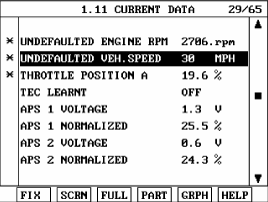
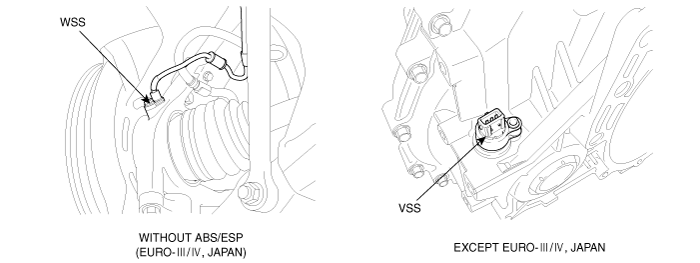
The wheel speed sensor or vehicle speed sensor is the essential component that the PCM uses to calculate vehicle speed. Digital wave is produced as tone-wheel rotates according to hall sensor principle. Frequency of duty wave is changed in proportion to rotation of tone wheel and PCM gets vehicle speed through ABS control unit or ESP control unit or wheel speed sensor or vehicle speed sensor. The PCM uses this signal to control fuel injection, ignition timing, transmission/transaxle shift scheduling and torque converter clutch scheduling.
Checking output signals from wheel speed sensor or ABS control unit or VSS every 30 sec. under detecting condition, if an signal is in the detecting condition for more than 20 sec., PCM sets P0501. MIL(Malfunction Indication Lamp) turns on when the malfunction lasts till cosecutive 2 driving cycle.
Item | Detecting Condition | Possible cause | |
DTC Strategy | ● Detects the lack of vehicle speed signal | ● Poor connection ● Open or short in harness ● Wheel speed sensor(FR) ● Vehicle speed sensor ● ABS or ESP control unit ● PCM | |
Enable Conditions | Case 1(Power) | ● Engine Running ● No VSS disabling malfunction present ● No TPS fault present ● No MAP fault present ● 11V〈 Ignition Voltage〈 16V ● Engine Coolant Temperature 〉60℃ (140℉) ● MAP 〉55kPa ● 25% ≤ TPS ≤ 60% ● 1200rpm ≤ Engine Speed ≤ 4000rpm ● Vehicle Speed derived from transmission ≥ 10 kph (6.2 mph) | |
Case 2(Decel) | ● Engine Running ● No VSS disabling malfunction present ● No TPS fault present ● No MAP fault present ● 11V〈 Ignition Voltage〈 16V ● Engine Coolant Temperature 〉60℃ (140℉) ● MAP〈 32kPa ● TPS〈 1% ● 1800rpm ≤ Engine Speed ≤ 6000rpm ● Transmission in gear | ||
Thresh old value | Case 1(Power) | ● VSS Fault Vehicle Speed ≤ 10kph | |
Case 2(Decel) | ● Vehicle Speed〈 5kph ● Delta Engine Speed ≥ 100rpm | ||
Diagnosis Time | ● Continuous (More than 20 seconds failure for every 30 seconds test ) | ||
MIL On Condition | ● 2 driving cycles | ||
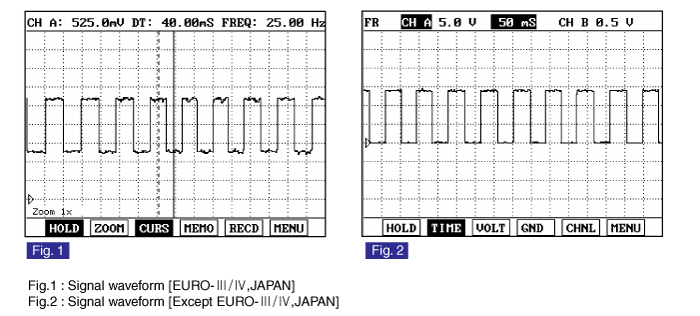
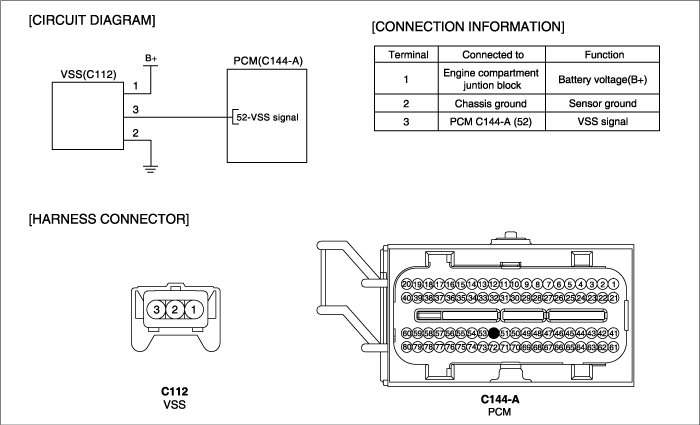
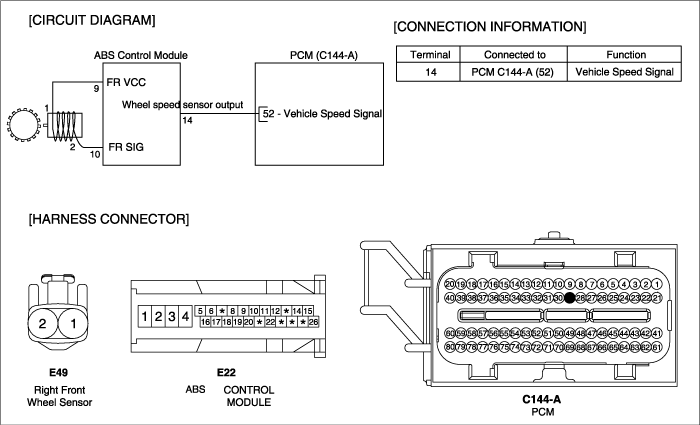
Ignition "OFF"
Connect Scantool and Engine "ON"
Drive vehicle in gear and monitor "vehicle speed" item on the scantool.

Are thsoe "VSS" parameters displayed correctly ?

▶ Fault is intermittent caused by poor contact in Sensor’s and/or PCM’s connector or was repaired and PCM memory was not cleared. Thoroughly check connectors for looseness, poor connection, bending, corrosion, contamination, deterioration, or damage. Repair or replace as necessary and go to "Verification of Vehicle Repair" procedure

▶ Go to "Terminal and Connector Inspection" procedure.
Many malfunctions in the electrical system are caused by poor harness and terminals. Faults can also be caused by interference from other electrical systems, and mechanical or chemical damage.
Thoroughly check connectors for looseness, poor connection, bending, corrosion, contamination, deterioration, or damage.
Has a problem been found?

▶ Repair as necessary and go to "Verification of Vehicle Repair" procedure

▶ Go to " Signal Circuit Inspection " procedure.
This procedure is applied to vehicle with ABS (or ESP). In case of no ABS(or ESP), refer to "C1203 Wheel speed sensor front-RH open/short".
Check short to ground in harness
IG "OFF"
Disconnect PCM connector and ABS or ESP control module connector.
Measure resistance between terminal 52 of PCM harness connector and chassis ground.
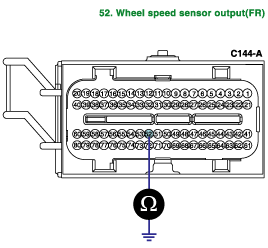
Specification : Infinite
Is the measured resistance within specifications?

▶ Go to "Check open in harness" as follows.

▶ Repair short to ground in harness, and go to "Verification of Vehicle Repair" procedure.
Check for open in harness
Ignition "OFF"
Disconnect PCM connector and ABS or ESP control module connector.
Measure resistance between terminal "52" of PCM harness connector and terminal "14(With ESP: terminal 40)" of ABS control module harness connector.
Specification : Approx. below 1Ω
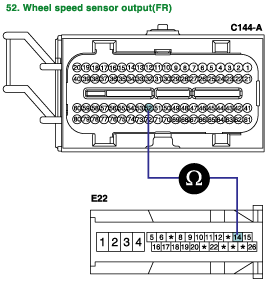
Note: This picture is only applied to vehicle with ABS
Is the measured resistance within specifications?

▶ Go to " Check wheel speed sensor " procedure.

▶ Check open in harenss.
▶ Repair or replace as necessary and then, go to " Verification of Vehicle Repair" procedure.
Check wheel speed sensor
IG "OFF"
Check open or short in wheel speed sensor (Refer to "C1203 Wheel speed sensor front-RH open/short")
Is the wheel speed sensor normal?

▶ Substitute with a known - good PCM/ ABS or ESP control unit and check for proper operation. If the problem is corrected, replace PCM/ ABS or ESP control unit and go to "Verification of Vehicle Repair" procedure.

▶ Repair or replace it as necessary.
▶ And then go to " Verification of Vehicle Repair" procedure.
There is a memory reset function on scantool that can erase optional parts automatically detected and memorized by PCM. After testing PCM on the vehicle, use this function to reuse the PCM on the others
Many malfunctions in the electrical system are caused by poor harness and terminals. Faults can also be caused by interference from other electrical systems, and mechanical or chemical damage.
Thoroughly check connectors for looseness, poor connection, bending, corrosion, contamination, deterioration, or damage.
Has a problem been found?

▶ Repair as necessary and go to "Verification of Vehicle Repair" procedure

▶ Go to " Power Circuit Inspection " procedure.
Check voltage
IG "OFF"
Disconnect vehicle speed sensor connector.
IG "ON" and ENG "OFF"
Measure voltage between terminal 1 of vehicle speed sensor harness connector and chassis ground.
Specification : Approx. 11.5 ~ 13V
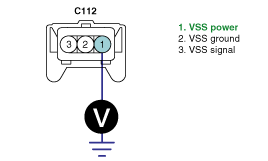
Is the measured voltage within specifications?

▶ Go to "Signal circuit inspection" procedure.

▶ Repair open or short to ground in harness, and go to "Verification of Vehicle Repair" procedure.
Especially Check the fuse related to Power for blown-off.
Check voltage from sensor side
IG "OFF"
Disconnect vehicle speed sensor connector.
IG "ON" and ENG "OFF"
Measure voltage between terminal 3 of vehicle speed sensor harness connector and chassis ground.
Specification : Approx. 8 ~ 11.5V
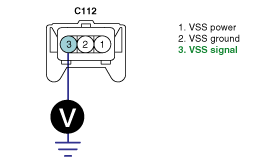
Is the measured voltage within specifications?

▶ Go to "Check voltage from PCM side" as follows.

▶ Repair open or short to ground in harness, and go to "Verification of Vehicle Repair" procedure.
Check voltage from PCM side
IG "OFF"
Disconnect PCM connector and vehicle speed sensor connector.
IG "ON" and ENG "OFF"
Measure voltage between terminal "52" of PCM harness connector and chassis ground.
Specification : Approx. 8 ~ 11.5V
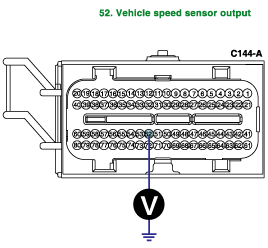
Is the measured voltage within specifications?

▶ Go to " Ground circuit inspection " procedure.

▶ Check open in harenss.
▶ Repair or replace as necessary and then, go to " Verification of Vehicle Repair" procedure.
IG "OFF"
Disconnect vehicle speed sensor connector.
IG "ON" and ENG "OFF"
Measure voltage between terminal 1 of vehicle speed sensor harness connector and chassis ground.(Fig.A)
Measure voltage between terminals 1 and 2 of vehicle speed sensor harness connector.(Fig.B)
Specification : Measurement "A" - Measurement 'B' = Approx. below 200mV

Is the measured voltage within specifications?

▶ Substitute with a known - good vehicle speed sensor and check for proper operation. If the problem is not correctd, substitute with a known - good PCM and check for proper operation. And go to "Verification of Vehicle Repair" procedure.

▶ Repair open or contact resistance in harness, and go to "Verification of Vehicle Repair" procedure.
There is a memory reset function on scantool that can erase optional parts automatically detected and memorized by PCM. After testing PCM on the vehicle, use this function to reuse the PCM on the others
After a repair, it is essential to verify that the fault has been corrected.
Monitor and record the Freeze Frame Data for the Diagnostic Trouble Code(DTC) which has been diagnosed.
Using a Scantool, Clear the DTCs
Operate the vehicle within conditions noted in the freeze frame data or enable conditions
Monitor that all rediness test have been verified as " Complete "
Are any DTCs present ?

▶ Go to the applicable troubleshoooting procedure.

▶ System is performing to specification at this time.